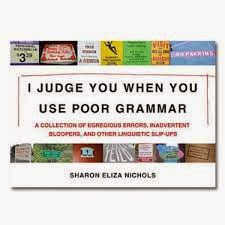You Have Been Weighed and Found Wanting
My children consider me a commanding officer of the grammar police. If you misuse a pronoun, a preposition, articles in front of words, a double negative or even a direct object, be prepared to be: 1st, corrected and 2nd, judged. Living in the deep south, we are already judged because of our accents, so if you add improper grammar on top of the accent...oy vey! Yeah, I police mine pretty closely.
I was subbing for Elizabeth's English class & noticed a cute book in her teacher's room titled: I judge you when you use poor grammar. The first thing it made me do was giggle, because, yeah, I do judge people (right, wrong or otherwise) who use poor grammar. I realize that you may be a member of Mensa, but if you are not using correct grammar, I will assume that you are uneducated. Now, don't get me wrong, I am not perfect, but at least I try to not sound like a country bumpkin. And, I really want this book. It's more like a picture book, but it's hilarious!
Here are some of the things that bother me the most:
So there you go. If you misuse any of the 11 above, be ready for the grammar police to stop by. But, now that you know, learn it, live it, love it. It's amazing how far using proper grammar will get you in life, so until my 5 get it right, I'll keep wearing my badge. :)
Celebrating Life!
~ashley
I was subbing for Elizabeth's English class & noticed a cute book in her teacher's room titled: I judge you when you use poor grammar. The first thing it made me do was giggle, because, yeah, I do judge people (right, wrong or otherwise) who use poor grammar. I realize that you may be a member of Mensa, but if you are not using correct grammar, I will assume that you are uneducated. Now, don't get me wrong, I am not perfect, but at least I try to not sound like a country bumpkin. And, I really want this book. It's more like a picture book, but it's hilarious!
Here are some of the things that bother me the most:
- There, Their & They're: There is a place. Their shows possession. They're is a contraction for They are.
- To, Too, Two: To is a preposition, it shows where you are going, but don't use it to end a sentence. Too is another word for also. Two is the number 2.
- Your & You're: your shows possession & you're is the contraction for you are.
- Its & It's: Its shows possession where It's is a contraction for it is. The way I make sure I'm using it right is to sub 'it is' in the sentence. Don't laugh, it works!
- He/She vs. Him/Her: The way I remember it is that him/her is used as a direct object & can show possession. Example: Give the ball to him. Who are you giving the ball to? You are giving it to him. I am taking Elizabeth to her dance lesson. Whose dance lesson is it? It's hers.
- She/Her and I/me: The way my mom always told us the difference was to take away the she/her and see if the sentence makes sense with I/me. You wouldn't say: Me is going to the store, and you also wouldn't say Her is going to the store, so it has to be She & I. (Me and her are going to get some food. No, no you're not, because me & her are not going anywhere!)
- Using a pronoun after the noun it would take the place of: my teacher, she. Yeah, just stop. It's either my teacher or just she, but not both.
- Double negatives. These are usually paired with the word ain't. I ain't never...yuck.
- Using an adjective when you should use an adverb. Adjectives answer: how many, which one, what kind & how many. Adverbs answer how, when, why & where. If you're saying how someone did something, use an adverb. Little hint, a lot of times you can make an adjective into an adverb by adding ly. See the final sentence in the first paragraph. Some would say close, but closely is the correct word to use. :)
- Good vs. Well: good is an adjective & well is an adverb. (See #9 for what they answer.) Something is good to eat, but you feel well. Get it? Got it? Good!
- Can I vs. May I: OMG, this one drives me crazy. When my children would use can I, I would always say: "I don't know, can you?" It's MAY I PLEASE! And, if you're a loving sweet child who wants to up the odds of you getting what you want, you will finish the sentence with: "because you're so great.". I trained my kids to say this when they were little, how else was I ever going to hear that I was great?
So there you go. If you misuse any of the 11 above, be ready for the grammar police to stop by. But, now that you know, learn it, live it, love it. It's amazing how far using proper grammar will get you in life, so until my 5 get it right, I'll keep wearing my badge. :)
Celebrating Life!
~ashley




Comments
Post a Comment